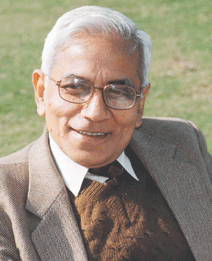Autar Nehru interviewed Ashok Chandra, chairman of the DPS Society, in Delhi. Excerpts.
 What were the aims and objectives of the DPS Society? How satisfied are you that they have been attained?
What were the aims and objectives of the DPS Society? How satisfied are you that they have been attained?
The objective behind the promotion of the DPS Society 70 years ago was to redefine K-12 education with the society playing an interventionist and catalytic role to empower students to become agents of change. Our society, from its inception, has been a pioneer in propagating new education.
Our children are encouraged to learn what interests them and in all DPS schools opportunities are made available for students to develop their talent in academics, co-curricular and extra-curricular activities. As far as satisfaction with our progress is concerned, nobody is fully satisfied because it will promote complacency. But at the same time we are quite pleased with what we have achieved in terms of establishing schools in India and abroad. Establishing high- quality schools in far-flung areas of the north-east, Jammu & Kashmir and interior Madhya Pradesh and West Bengal is a major achievement and cause for satisfaction.
Recently there was a reported division within the trustees of DPS over the issue of allegedly high licensing fees being demanded from promoters of franchised schools. To what extent has the issue been resolved? What is the outcome?
Differences of opinion are inevitable in every democratic institution. What is important is that decisions have been taken and implemented. Now there are no differences of opinion in the DPS family. Issues have been resolved and we are united.
What is the package of services which the DPS Society provides affiliate/ franchised schools in consideration of the licence fee?
We don’t differentiate between our schools and affiliated schools as far delivery of services and processes are concerned. We are fully involved with all our schools and make our expertise, methodologies, systems and experience available to every DPS institution. Our objective is to inject the DPS way of education into every owned and affiliated school. Therefore we are involved in the management, selection of principals, teachers and formulation of curriculums of all DPS institutions.
What in your opinion are the differentiating characteristics of DPS k-12 education?
We aim for the highest standards of excellence and provide our students access to the best opportunities for all-around growth and advancement. And to achieve this, we respect every child as an individual and provide her individualised attention. Moreover, DPS students everywhere are encouraged to discover themselves in facilitating environments, to grow into confident personalities who can avail of all opportunities and make the best of their lives. We offer best faculty, state-of-the-art infrastructure, activity-based learning pedagogies, excellent sports facilities and a wide range of co-curricular education options. All this results in academic excellence which is widely admired.
What are the future growth and development plans of the DPS society?
The DPS development model necessi-tates active involvement of the society with all affiliated schools under the DPS brand umbrella. This model has enabled us to ensure standardisation and maintain the reputation of the DPS brand. Therefore I don’t think we will be able to stretch ourselves to accom-modate the 300-plus affiliation applications pending before the society. While we will continue to co-promote new DPS schools, we are also debating the idea of promoting a consultancy wing to advise educati-onists to promote and/or upgrade their institutions to DPS standards.
Will the implementation of RTE Act, 2009 in anyway impact brand DPS?
These are early days to comment on the RTE Act. But it is now law of the land and we cannot wish it away. There are some aspects of this legislation which need rethinking or reconsi-deration but as I said often, we have no choice but to accept it. At the same time right thinking persons should ask why the teachers in government schools don’t show the degree of commitment exhibited by our teachers.